How To Create A Professional Press Kit For Your Startup
The first step in getting more press coverage for your company: make it easy for journalists to write about you! Don't make them search for information about your company.
Put everything a journalist needs to know to write about you in one place: your press kit.
A press kit is an essential part of your website. You should have it from day one.
Take a look at the websites of some established startups, like Dropbox, Airbnb, Stripe, Uber, Kickstarter or any other.
They have all different landing pages (speaking to their respective audience), but they have one thing in common. One thing they all do the same.
They all have the same static pages:
Some of these pages are legal requirements in some countries. But it's more than that:
Websites who don't have these pages, just don't look professional. These pages are important for people to take you seriously.
Every company, no matter what size, should have them from day one.
If you have a nice looking press kit, it will be part of your online presence, your branding. It will make you look like an established company. And if a reporter is interested in writing about you, they have all the information they need in one place.
The Anatomy Of A Professional Press Kit
So how does a professional press kit look like? What content should you include?
1) The Essentials
The essentials, the absolute bare minimum that should be in every press kit:Contact Information

Social Media Links

Company Address

About Text

An introduction text about your company. The shortest possible version of this is just one sentence: what is your company doing?
But you can also go into more detail. You can talk about your company's history. When and how it was founded. By whom?
You could talk about your mission. What's your goal, what would you like to accomplish?
You can list important milestones that you already reached, or let reporters know what you have on your roadmap.
2) Recent Press Coverage
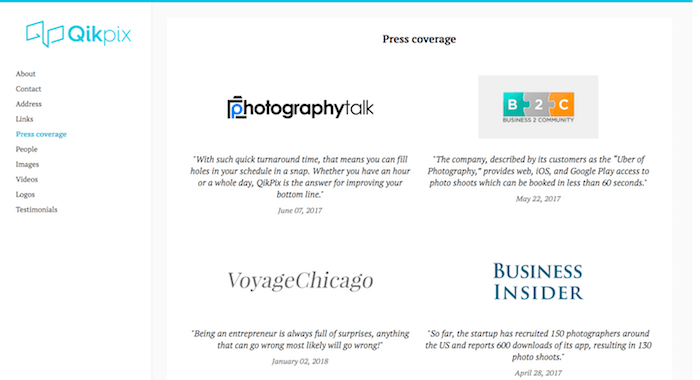
A list of recent articles written about your company. Arguably one of the most important section in your press kit.
After launching a company, the dream of every founder is to get an article published in a big publication.
Getting press coverage means getting attention. It can lead to the first wave of traffic to your website.
And getting press coverage is not just good for getting new customers. It's also good for social proof.
It makes everything else easier: Convincing investors to fund your next round of funding, convincing prospects who visit your site to become customers, convince other people to join your team... If a publication writes about your company it means they vetted you. You convinced someone to write an article about you, so there must be something there, right?
It also makes it easier to convince other journalists to write about you. Which can lead to even more press coverage, which then can lead to more, and more and so on: a snowball effect.
So start small, with a few smaller publications, and use the coverage you have to get more.
3) Awards

If your company has received any awards, or won a competition or got any form of public recognition you should absolutely put that in your press kit.
It's a good way to show a reporter someone else has already vetted you.
4) Images

5) Logos

6) Team

A list of people who work on your team, with name, picture and their title.
7) Downloads

In this section you can offer reporters documents you want them to have access to. A research paper your founder has written about your problem space? The whitepaper that started the company? A detailed product manual. A spreadsheet? And so on...
8) Testimonials

Testimonials from your customers also provide some social proof. You could copy quotes from review websites, or maybe you have reached out to customers to get a quote?
9) Videos

Maybe you have some interesting videos on Youtube? Interviews with your founder? A screencast? A demo video showing off your product? Put the most relevant in your press kit.
10) Press Releases

Press releases are for big milestones: Your 10.000th user signed up. Revenue doubled in the last 6 months. You raised X dollars in your new funding round. You are launching a big new feature...
Whatever it is, if you write a press release about it, obviously put it also in your press kit.
What tools can I use to create a press kit?
1) Static Html / CMS
A press kit is nothing more then a dedicated page on your website. Whatever you use to build your website (Wordpress, Drupal, Squarespace, HTML), use it to add one more page (yourcompany.com/press) and fill it with content.
3) .zip File
If you don't have time to build out an additional page on your website, you could simply put all content (images, logos, documents) into a .zip file, and offer it as a download.
2) Dropbox / Google Drive
Another thing I see companies do, is use Dropbox or Google Drive to host their press kit. They upload everything into a dedicated folder, and link to it from their website. It's honestly not the most user friendly solution, but if you want to get started quickly, it's better then nothing
4) PressKitHero
Frankly, I didn't like any of the solutions above, so I created a tool to help businesses create a press kit in just a few clicks: PressKitHero
It has all the sections from above, it's easy to setup (just fill in your information, no coding required) and it looks good.
You can customize the layout, and set it up under your own domain (e.g. press.yourcompany.com)
The screenshots from above are all from press kits generated by PressKitHero. If you like what you see, you can sign up and create your own press kit in just a few clicks.
A few examples of some of our happy users: Team Extension , Piper , Qikpix , Qnect , FlyOtto
examples of good looking press kits
If you need more inspiration, here are a few press kits from around the web:
1) Transferwise
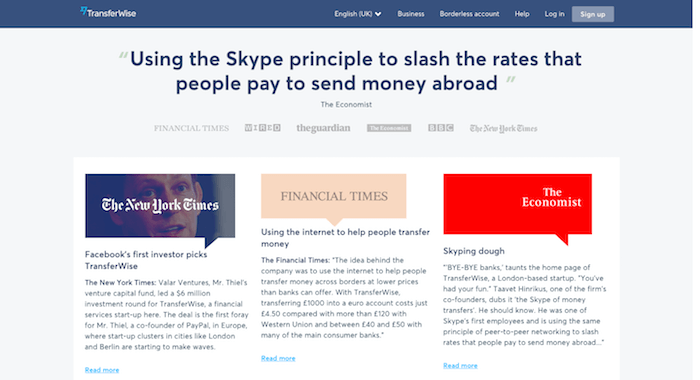
Really nice looking press kit, with a heavy focus on past press coverage. I especially like the big quote on top of the page. The quote is summarizing what the company is doing, but quoting The Economist gives it more weight.
1) Dropbox

Of course Dropbox is using Dropbox for their press kit. I like that. It acts as a press kit, and shows one use case of Dropbox at the same time.
1) Kickstarter
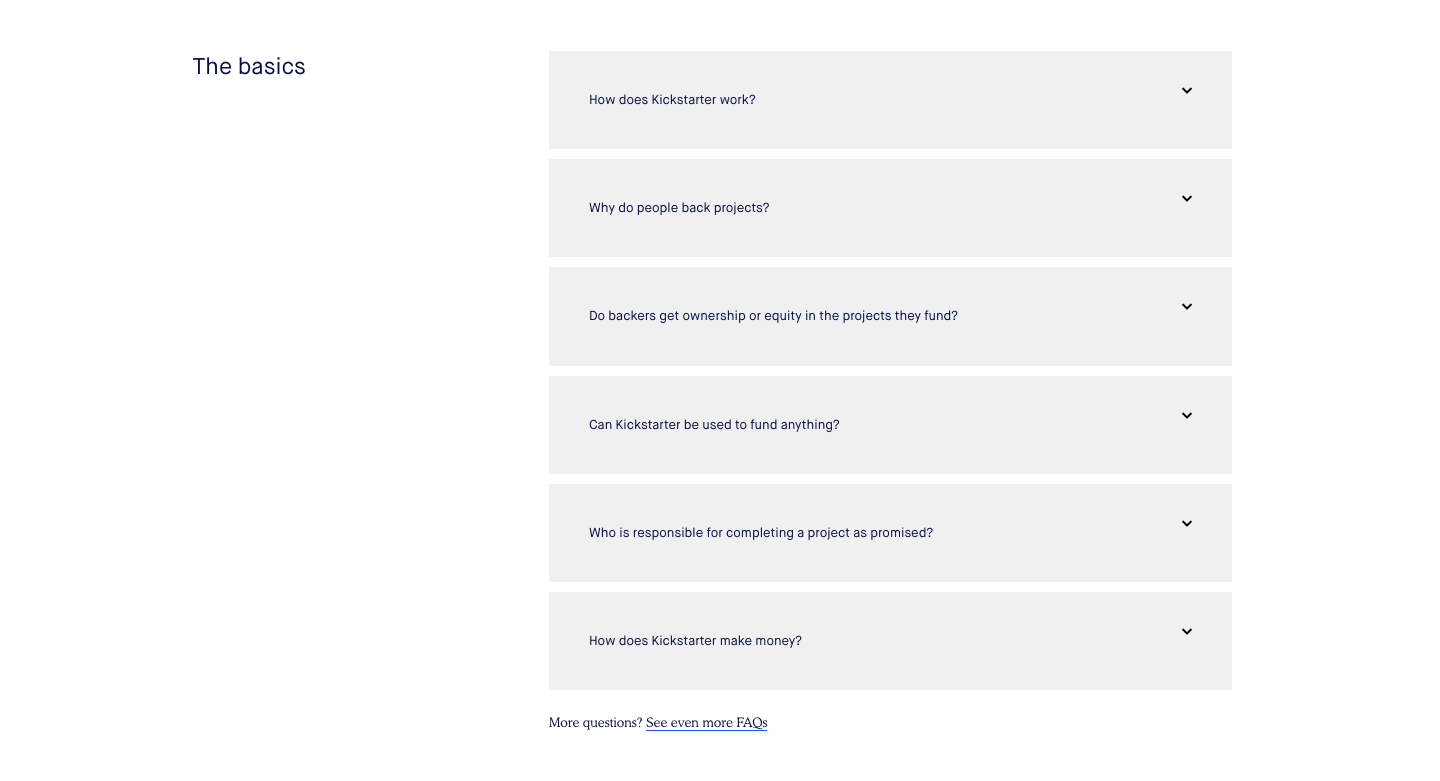
Kickstarter's press kit includes a FAQ section, to answer the most basic questions.
1) Airbnb

What I like about Airbnb's press kit, is the section "Fast Facts", where they show their four most impressive numbers to give an overview over their business: 4.5 mm listings, 81k cities, 191 countries and 300 mm guest arrivals.
1) Atlassian

Atlassian has a section with all logos from their different software products, which is nice given that they have so many.
1) Blossom

1) Clearbit
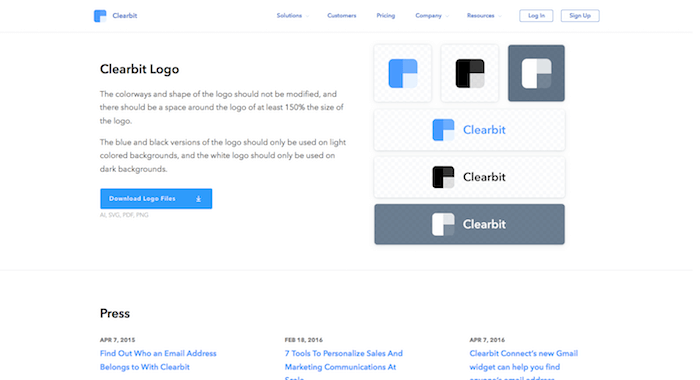
Clearbit offers multiple versions of their logo, so reporters can choose the one that fits to the layout of their publication.
1) Gusto
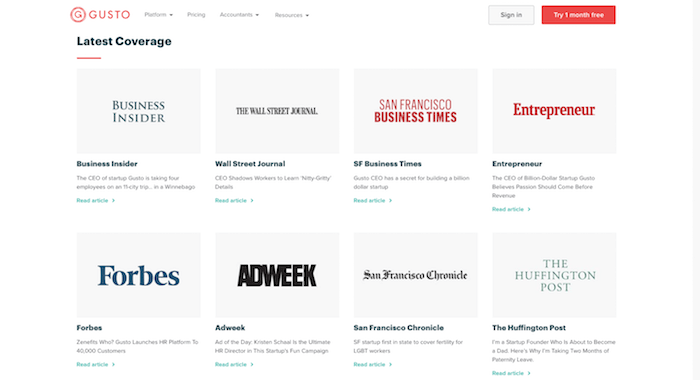
Gusto has a simple, nice looking press kit with a heavy focus on past press coverage.
1) Impraise
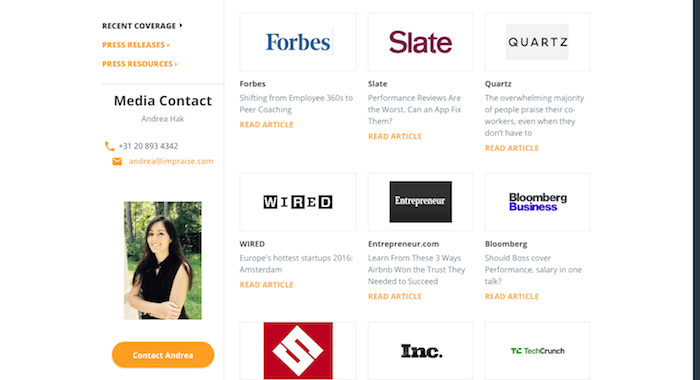
Always visible on the press kit of Impraise, is the sticky navigation on the left side, which includes a picture, the name and contact information of the person who reporters can contact for press inquiries.
1) Intercom

Simple, but very nice press kit which blends in with the rest of Intercom's website.
1) Slack

Slack's press kit ends with a note on how to get in touch, and some links where you can follow them around the web.